Supporting Campus Childcare Services for Student Success
VerifiedAdded on 2019/09/18
|6
|1600
|516
Report
AI Summary
CCAMPIS (Child Care Access Means Parents in School) is a program that aims to increase access to postsecondary education for low-income parents by providing quality, affordable, and accessible child-care services while they further their education. The program supports the establishment of campus-based child-care programs that primarily serve the needs of low-income students enrolled at institutions of higher education.
Contribute Materials
Your contribution can guide someone’s learning journey. Share your
documents today.
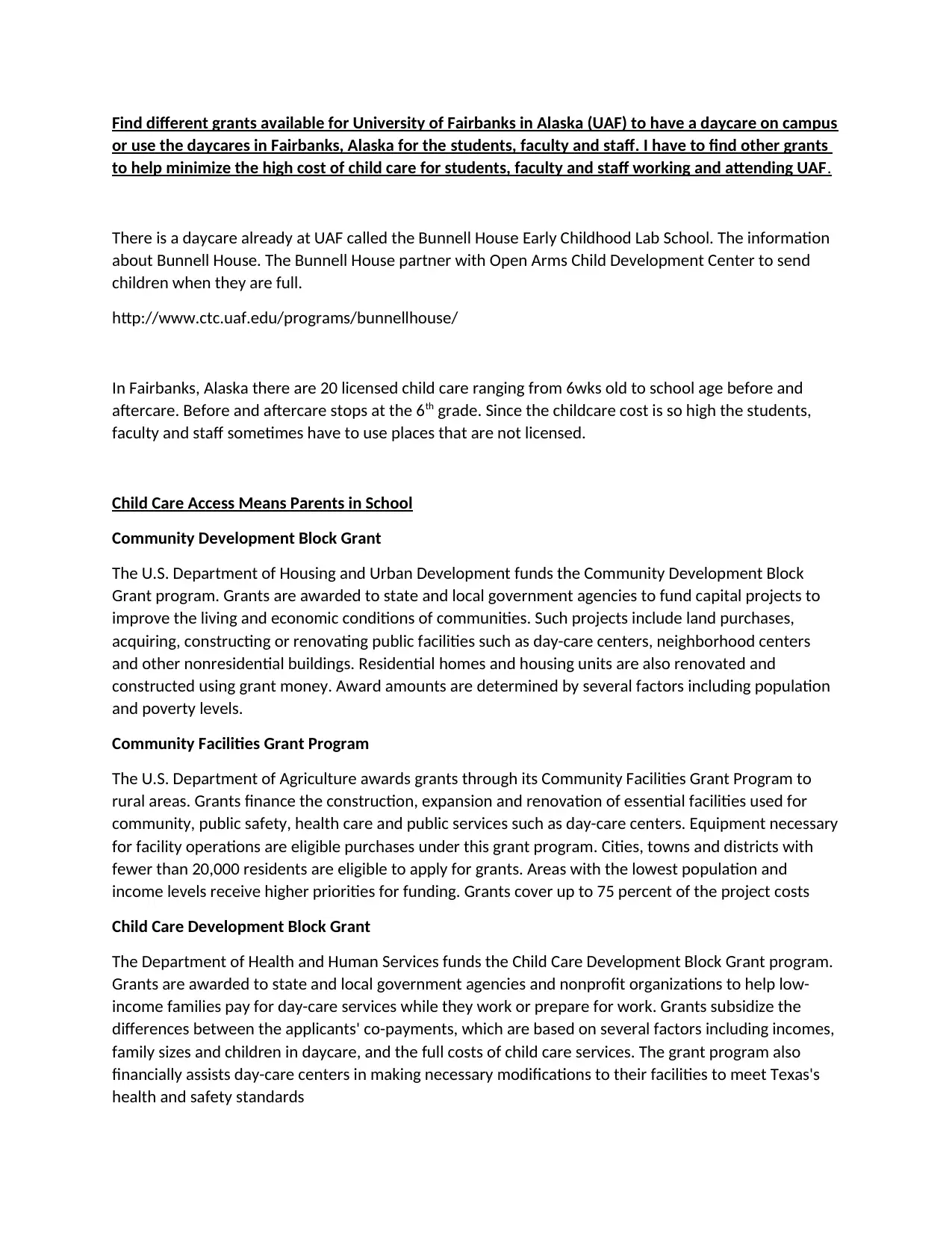
Find different grants available for University of Fairbanks in Alaska (UAF) to have a daycare on campus
or use the daycares in Fairbanks, Alaska for the students, faculty and staff. I have to find other grants
to help minimize the high cost of child care for students, faculty and staff working and attending UAF.
There is a daycare already at UAF called the Bunnell House Early Childhood Lab School. The information
about Bunnell House. The Bunnell House partner with Open Arms Child Development Center to send
children when they are full.
http://www.ctc.uaf.edu/programs/bunnellhouse/
In Fairbanks, Alaska there are 20 licensed child care ranging from 6wks old to school age before and
aftercare. Before and aftercare stops at the 6th grade. Since the childcare cost is so high the students,
faculty and staff sometimes have to use places that are not licensed.
Child Care Access Means Parents in School
Community Development Block Grant
The U.S. Department of Housing and Urban Development funds the Community Development Block
Grant program. Grants are awarded to state and local government agencies to fund capital projects to
improve the living and economic conditions of communities. Such projects include land purchases,
acquiring, constructing or renovating public facilities such as day-care centers, neighborhood centers
and other nonresidential buildings. Residential homes and housing units are also renovated and
constructed using grant money. Award amounts are determined by several factors including population
and poverty levels.
Community Facilities Grant Program
The U.S. Department of Agriculture awards grants through its Community Facilities Grant Program to
rural areas. Grants finance the construction, expansion and renovation of essential facilities used for
community, public safety, health care and public services such as day-care centers. Equipment necessary
for facility operations are eligible purchases under this grant program. Cities, towns and districts with
fewer than 20,000 residents are eligible to apply for grants. Areas with the lowest population and
income levels receive higher priorities for funding. Grants cover up to 75 percent of the project costs
Child Care Development Block Grant
The Department of Health and Human Services funds the Child Care Development Block Grant program.
Grants are awarded to state and local government agencies and nonprofit organizations to help low-
income families pay for day-care services while they work or prepare for work. Grants subsidize the
differences between the applicants' co-payments, which are based on several factors including incomes,
family sizes and children in daycare, and the full costs of child care services. The grant program also
financially assists day-care centers in making necessary modifications to their facilities to meet Texas's
health and safety standards
or use the daycares in Fairbanks, Alaska for the students, faculty and staff. I have to find other grants
to help minimize the high cost of child care for students, faculty and staff working and attending UAF.
There is a daycare already at UAF called the Bunnell House Early Childhood Lab School. The information
about Bunnell House. The Bunnell House partner with Open Arms Child Development Center to send
children when they are full.
http://www.ctc.uaf.edu/programs/bunnellhouse/
In Fairbanks, Alaska there are 20 licensed child care ranging from 6wks old to school age before and
aftercare. Before and aftercare stops at the 6th grade. Since the childcare cost is so high the students,
faculty and staff sometimes have to use places that are not licensed.
Child Care Access Means Parents in School
Community Development Block Grant
The U.S. Department of Housing and Urban Development funds the Community Development Block
Grant program. Grants are awarded to state and local government agencies to fund capital projects to
improve the living and economic conditions of communities. Such projects include land purchases,
acquiring, constructing or renovating public facilities such as day-care centers, neighborhood centers
and other nonresidential buildings. Residential homes and housing units are also renovated and
constructed using grant money. Award amounts are determined by several factors including population
and poverty levels.
Community Facilities Grant Program
The U.S. Department of Agriculture awards grants through its Community Facilities Grant Program to
rural areas. Grants finance the construction, expansion and renovation of essential facilities used for
community, public safety, health care and public services such as day-care centers. Equipment necessary
for facility operations are eligible purchases under this grant program. Cities, towns and districts with
fewer than 20,000 residents are eligible to apply for grants. Areas with the lowest population and
income levels receive higher priorities for funding. Grants cover up to 75 percent of the project costs
Child Care Development Block Grant
The Department of Health and Human Services funds the Child Care Development Block Grant program.
Grants are awarded to state and local government agencies and nonprofit organizations to help low-
income families pay for day-care services while they work or prepare for work. Grants subsidize the
differences between the applicants' co-payments, which are based on several factors including incomes,
family sizes and children in daycare, and the full costs of child care services. The grant program also
financially assists day-care centers in making necessary modifications to their facilities to meet Texas's
health and safety standards
Secure Best Marks with AI Grader
Need help grading? Try our AI Grader for instant feedback on your assignments.
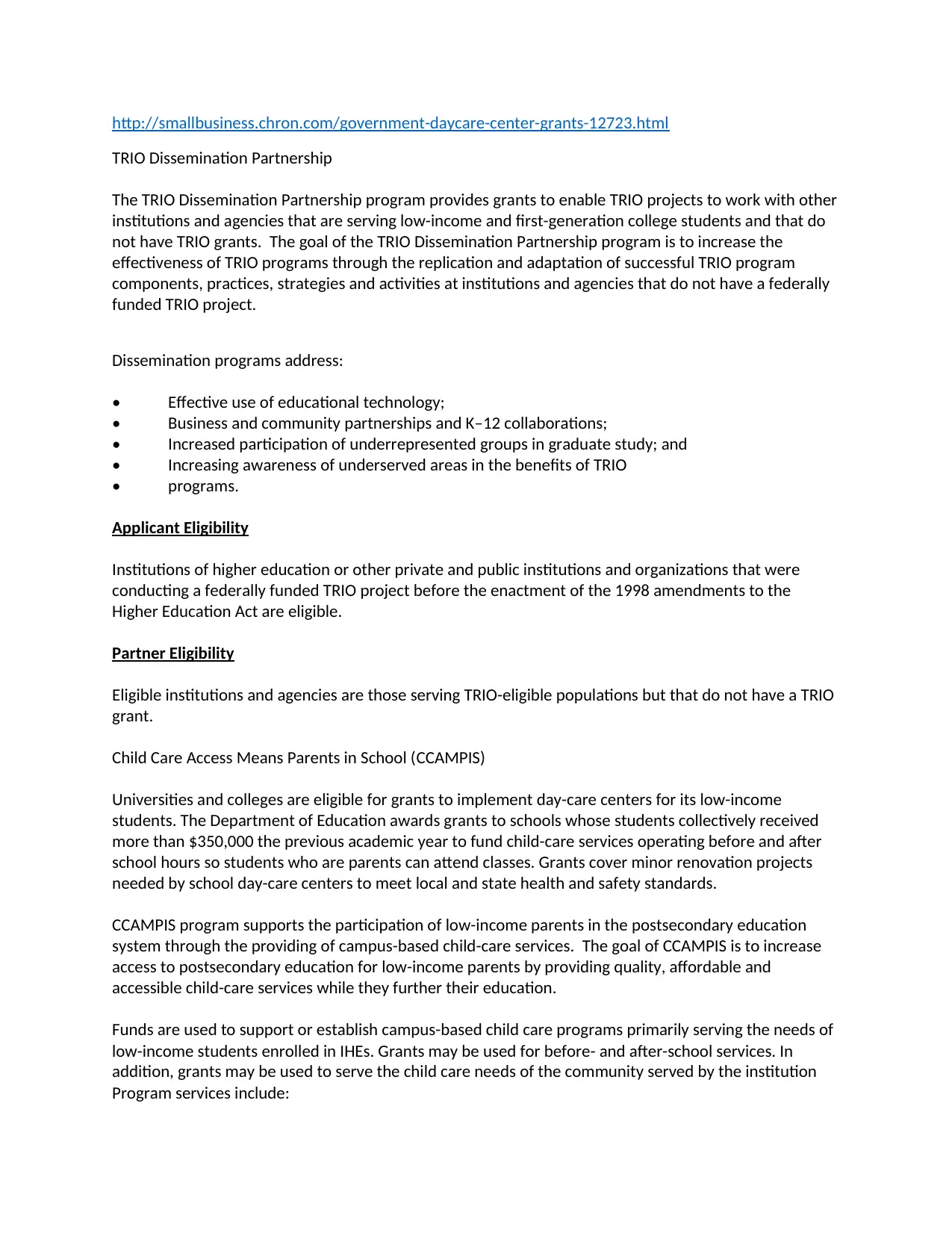
http://smallbusiness.chron.com/government-daycare-center-grants-12723.html
TRIO Dissemination Partnership
The TRIO Dissemination Partnership program provides grants to enable TRIO projects to work with other
institutions and agencies that are serving low-income and first-generation college students and that do
not have TRIO grants. The goal of the TRIO Dissemination Partnership program is to increase the
effectiveness of TRIO programs through the replication and adaptation of successful TRIO program
components, practices, strategies and activities at institutions and agencies that do not have a federally
funded TRIO project.
Dissemination programs address:
• Effective use of educational technology;
• Business and community partnerships and K–12 collaborations;
• Increased participation of underrepresented groups in graduate study; and
• Increasing awareness of underserved areas in the benefits of TRIO
• programs.
Applicant Eligibility
Institutions of higher education or other private and public institutions and organizations that were
conducting a federally funded TRIO project before the enactment of the 1998 amendments to the
Higher Education Act are eligible.
Partner Eligibility
Eligible institutions and agencies are those serving TRIO-eligible populations but that do not have a TRIO
grant.
Child Care Access Means Parents in School (CCAMPIS)
Universities and colleges are eligible for grants to implement day-care centers for its low-income
students. The Department of Education awards grants to schools whose students collectively received
more than $350,000 the previous academic year to fund child-care services operating before and after
school hours so students who are parents can attend classes. Grants cover minor renovation projects
needed by school day-care centers to meet local and state health and safety standards.
CCAMPIS program supports the participation of low-income parents in the postsecondary education
system through the providing of campus-based child-care services. The goal of CCAMPIS is to increase
access to postsecondary education for low-income parents by providing quality, affordable and
accessible child-care services while they further their education.
Funds are used to support or establish campus-based child care programs primarily serving the needs of
low-income students enrolled in IHEs. Grants may be used for before- and after-school services. In
addition, grants may be used to serve the child care needs of the community served by the institution
Program services include:
TRIO Dissemination Partnership
The TRIO Dissemination Partnership program provides grants to enable TRIO projects to work with other
institutions and agencies that are serving low-income and first-generation college students and that do
not have TRIO grants. The goal of the TRIO Dissemination Partnership program is to increase the
effectiveness of TRIO programs through the replication and adaptation of successful TRIO program
components, practices, strategies and activities at institutions and agencies that do not have a federally
funded TRIO project.
Dissemination programs address:
• Effective use of educational technology;
• Business and community partnerships and K–12 collaborations;
• Increased participation of underrepresented groups in graduate study; and
• Increasing awareness of underserved areas in the benefits of TRIO
• programs.
Applicant Eligibility
Institutions of higher education or other private and public institutions and organizations that were
conducting a federally funded TRIO project before the enactment of the 1998 amendments to the
Higher Education Act are eligible.
Partner Eligibility
Eligible institutions and agencies are those serving TRIO-eligible populations but that do not have a TRIO
grant.
Child Care Access Means Parents in School (CCAMPIS)
Universities and colleges are eligible for grants to implement day-care centers for its low-income
students. The Department of Education awards grants to schools whose students collectively received
more than $350,000 the previous academic year to fund child-care services operating before and after
school hours so students who are parents can attend classes. Grants cover minor renovation projects
needed by school day-care centers to meet local and state health and safety standards.
CCAMPIS program supports the participation of low-income parents in the postsecondary education
system through the providing of campus-based child-care services. The goal of CCAMPIS is to increase
access to postsecondary education for low-income parents by providing quality, affordable and
accessible child-care services while they further their education.
Funds are used to support or establish campus-based child care programs primarily serving the needs of
low-income students enrolled in IHEs. Grants may be used for before- and after-school services. In
addition, grants may be used to serve the child care needs of the community served by the institution
Program services include:
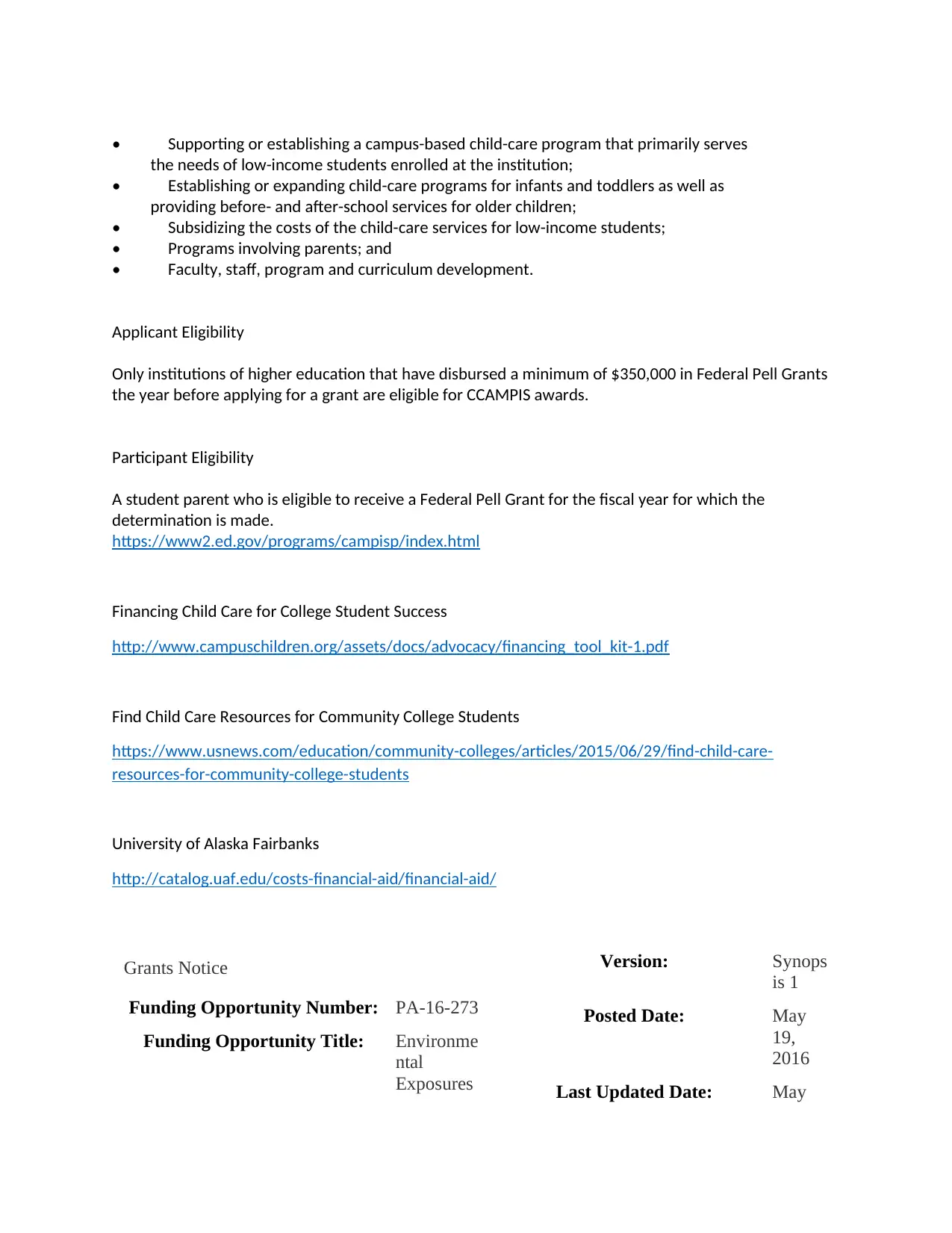
• Supporting or establishing a campus-based child-care program that primarily serves
the needs of low-income students enrolled at the institution;
• Establishing or expanding child-care programs for infants and toddlers as well as
providing before- and after-school services for older children;
• Subsidizing the costs of the child-care services for low-income students;
• Programs involving parents; and
• Faculty, staff, program and curriculum development.
Applicant Eligibility
Only institutions of higher education that have disbursed a minimum of $350,000 in Federal Pell Grants
the year before applying for a grant are eligible for CCAMPIS awards.
Participant Eligibility
A student parent who is eligible to receive a Federal Pell Grant for the fiscal year for which the
determination is made.
https://www2.ed.gov/programs/campisp/index.html
Financing Child Care for College Student Success
http://www.campuschildren.org/assets/docs/advocacy/financing_tool_kit-1.pdf
Find Child Care Resources for Community College Students
https://www.usnews.com/education/community-colleges/articles/2015/06/29/find-child-care-
resources-for-community-college-students
University of Alaska Fairbanks
http://catalog.uaf.edu/costs-financial-aid/financial-aid/
Grants Notice
Funding Opportunity Number: PA-16-273
Funding Opportunity Title: Environme
ntal
Exposures
Version: Synops
is 1
Posted Date: May
19,
2016
Last Updated Date: May
the needs of low-income students enrolled at the institution;
• Establishing or expanding child-care programs for infants and toddlers as well as
providing before- and after-school services for older children;
• Subsidizing the costs of the child-care services for low-income students;
• Programs involving parents; and
• Faculty, staff, program and curriculum development.
Applicant Eligibility
Only institutions of higher education that have disbursed a minimum of $350,000 in Federal Pell Grants
the year before applying for a grant are eligible for CCAMPIS awards.
Participant Eligibility
A student parent who is eligible to receive a Federal Pell Grant for the fiscal year for which the
determination is made.
https://www2.ed.gov/programs/campisp/index.html
Financing Child Care for College Student Success
http://www.campuschildren.org/assets/docs/advocacy/financing_tool_kit-1.pdf
Find Child Care Resources for Community College Students
https://www.usnews.com/education/community-colleges/articles/2015/06/29/find-child-care-
resources-for-community-college-students
University of Alaska Fairbanks
http://catalog.uaf.edu/costs-financial-aid/financial-aid/
Grants Notice
Funding Opportunity Number: PA-16-273
Funding Opportunity Title: Environme
ntal
Exposures
Version: Synops
is 1
Posted Date: May
19,
2016
Last Updated Date: May
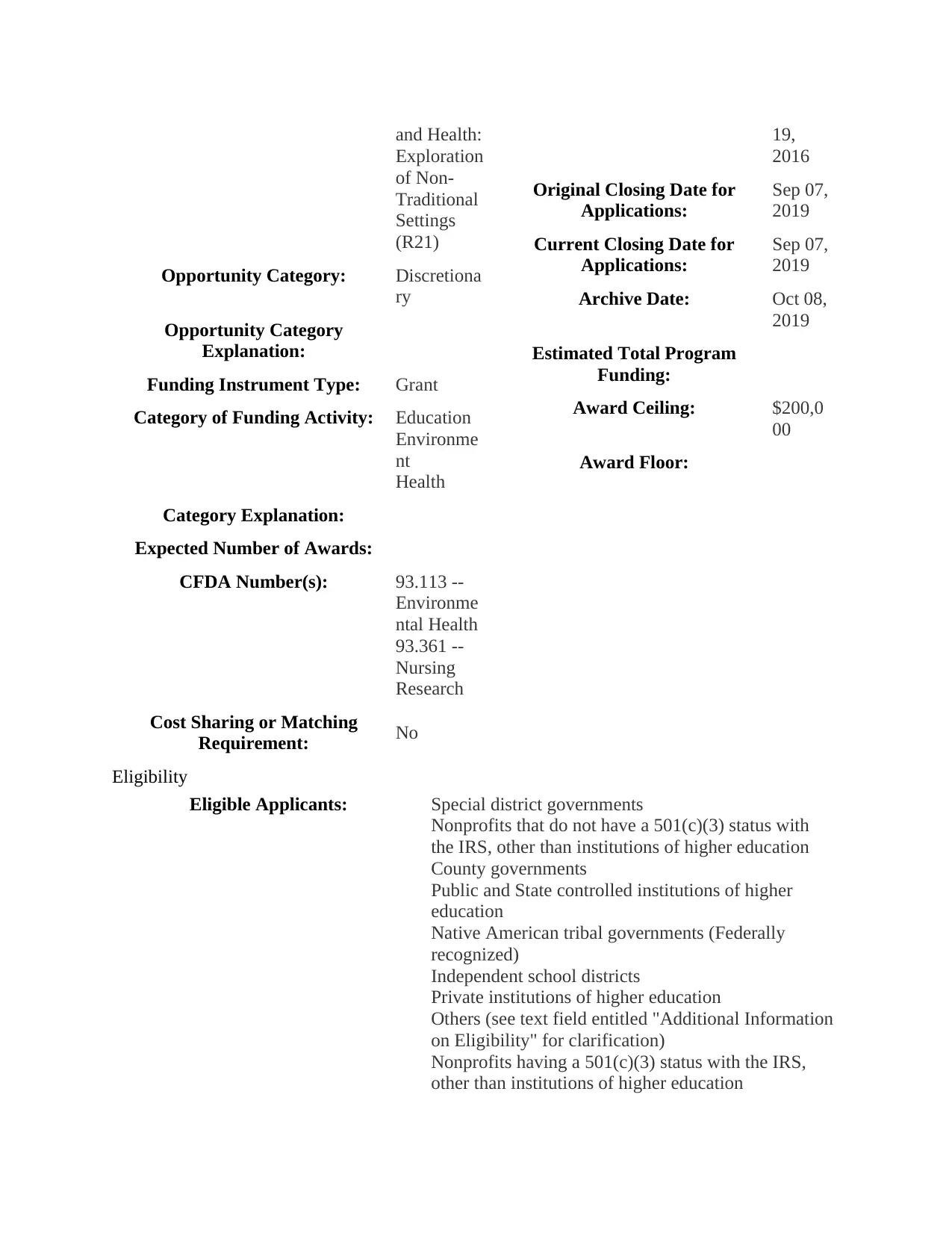
and Health:
Exploration
of Non-
Traditional
Settings
(R21)
Opportunity Category: Discretiona
ry
Opportunity Category
Explanation:
Funding Instrument Type: Grant
Category of Funding Activity: Education
Environme
nt
Health
Category Explanation:
Expected Number of Awards:
CFDA Number(s): 93.113 --
Environme
ntal Health
93.361 --
Nursing
Research
Cost Sharing or Matching
Requirement: No
19,
2016
Original Closing Date for
Applications:
Sep 07,
2019
Current Closing Date for
Applications:
Sep 07,
2019
Archive Date: Oct 08,
2019
Estimated Total Program
Funding:
Award Ceiling: $200,0
00
Award Floor:
Eligibility
Eligible Applicants: Special district governments
Nonprofits that do not have a 501(c)(3) status with
the IRS, other than institutions of higher education
County governments
Public and State controlled institutions of higher
education
Native American tribal governments (Federally
recognized)
Independent school districts
Private institutions of higher education
Others (see text field entitled "Additional Information
on Eligibility" for clarification)
Nonprofits having a 501(c)(3) status with the IRS,
other than institutions of higher education
Exploration
of Non-
Traditional
Settings
(R21)
Opportunity Category: Discretiona
ry
Opportunity Category
Explanation:
Funding Instrument Type: Grant
Category of Funding Activity: Education
Environme
nt
Health
Category Explanation:
Expected Number of Awards:
CFDA Number(s): 93.113 --
Environme
ntal Health
93.361 --
Nursing
Research
Cost Sharing or Matching
Requirement: No
19,
2016
Original Closing Date for
Applications:
Sep 07,
2019
Current Closing Date for
Applications:
Sep 07,
2019
Archive Date: Oct 08,
2019
Estimated Total Program
Funding:
Award Ceiling: $200,0
00
Award Floor:
Eligibility
Eligible Applicants: Special district governments
Nonprofits that do not have a 501(c)(3) status with
the IRS, other than institutions of higher education
County governments
Public and State controlled institutions of higher
education
Native American tribal governments (Federally
recognized)
Independent school districts
Private institutions of higher education
Others (see text field entitled "Additional Information
on Eligibility" for clarification)
Nonprofits having a 501(c)(3) status with the IRS,
other than institutions of higher education
Secure Best Marks with AI Grader
Need help grading? Try our AI Grader for instant feedback on your assignments.
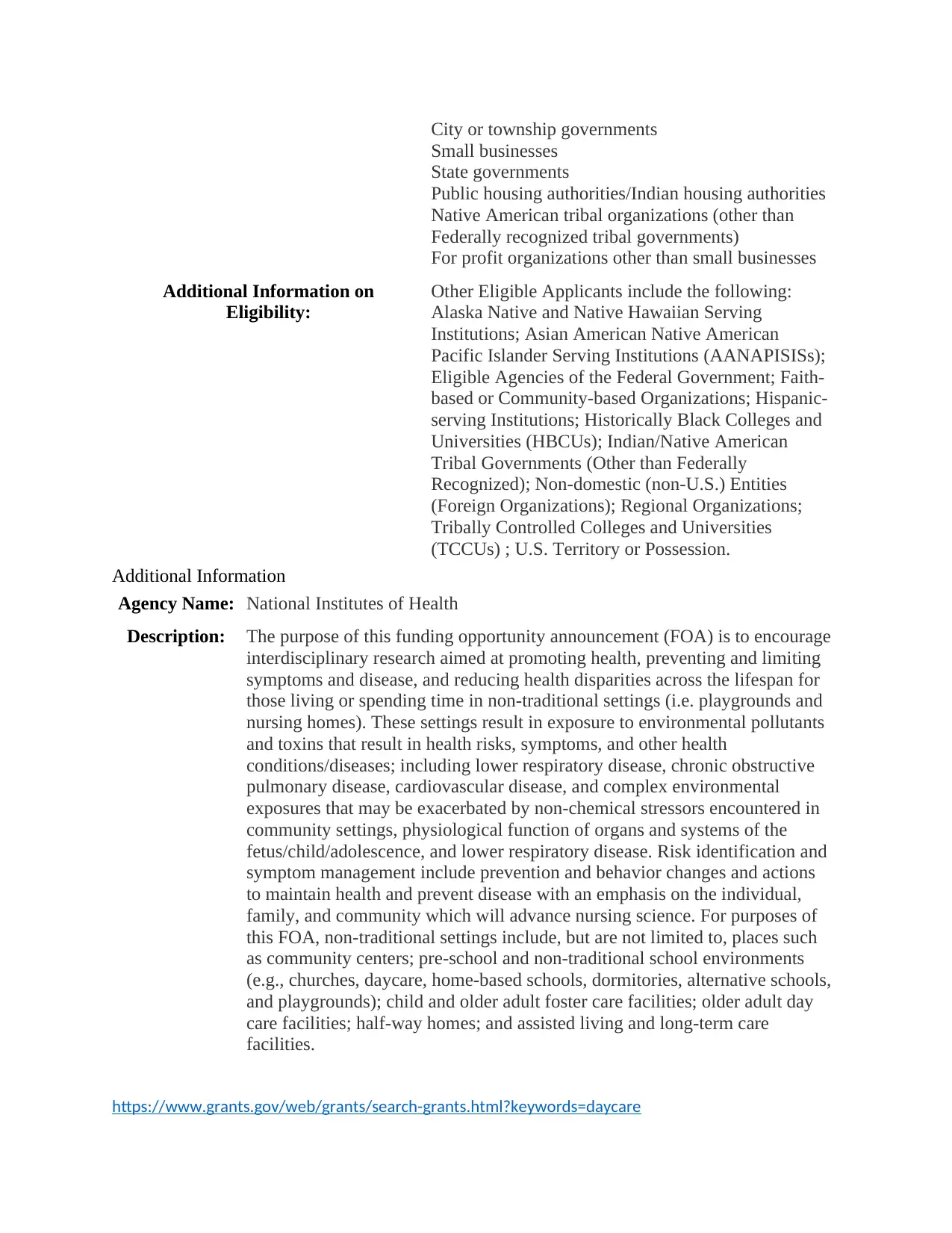
City or township governments
Small businesses
State governments
Public housing authorities/Indian housing authorities
Native American tribal organizations (other than
Federally recognized tribal governments)
For profit organizations other than small businesses
Additional Information on
Eligibility:
Other Eligible Applicants include the following:
Alaska Native and Native Hawaiian Serving
Institutions; Asian American Native American
Pacific Islander Serving Institutions (AANAPISISs);
Eligible Agencies of the Federal Government; Faith-
based or Community-based Organizations; Hispanic-
serving Institutions; Historically Black Colleges and
Universities (HBCUs); Indian/Native American
Tribal Governments (Other than Federally
Recognized); Non-domestic (non-U.S.) Entities
(Foreign Organizations); Regional Organizations;
Tribally Controlled Colleges and Universities
(TCCUs) ; U.S. Territory or Possession.
Additional Information
Agency Name: National Institutes of Health
Description: The purpose of this funding opportunity announcement (FOA) is to encourage
interdisciplinary research aimed at promoting health, preventing and limiting
symptoms and disease, and reducing health disparities across the lifespan for
those living or spending time in non-traditional settings (i.e. playgrounds and
nursing homes). These settings result in exposure to environmental pollutants
and toxins that result in health risks, symptoms, and other health
conditions/diseases; including lower respiratory disease, chronic obstructive
pulmonary disease, cardiovascular disease, and complex environmental
exposures that may be exacerbated by non-chemical stressors encountered in
community settings, physiological function of organs and systems of the
fetus/child/adolescence, and lower respiratory disease. Risk identification and
symptom management include prevention and behavior changes and actions
to maintain health and prevent disease with an emphasis on the individual,
family, and community which will advance nursing science. For purposes of
this FOA, non-traditional settings include, but are not limited to, places such
as community centers; pre-school and non-traditional school environments
(e.g., churches, daycare, home-based schools, dormitories, alternative schools,
and playgrounds); child and older adult foster care facilities; older adult day
care facilities; half-way homes; and assisted living and long-term care
facilities.
https://www.grants.gov/web/grants/search-grants.html?keywords=daycare
Small businesses
State governments
Public housing authorities/Indian housing authorities
Native American tribal organizations (other than
Federally recognized tribal governments)
For profit organizations other than small businesses
Additional Information on
Eligibility:
Other Eligible Applicants include the following:
Alaska Native and Native Hawaiian Serving
Institutions; Asian American Native American
Pacific Islander Serving Institutions (AANAPISISs);
Eligible Agencies of the Federal Government; Faith-
based or Community-based Organizations; Hispanic-
serving Institutions; Historically Black Colleges and
Universities (HBCUs); Indian/Native American
Tribal Governments (Other than Federally
Recognized); Non-domestic (non-U.S.) Entities
(Foreign Organizations); Regional Organizations;
Tribally Controlled Colleges and Universities
(TCCUs) ; U.S. Territory or Possession.
Additional Information
Agency Name: National Institutes of Health
Description: The purpose of this funding opportunity announcement (FOA) is to encourage
interdisciplinary research aimed at promoting health, preventing and limiting
symptoms and disease, and reducing health disparities across the lifespan for
those living or spending time in non-traditional settings (i.e. playgrounds and
nursing homes). These settings result in exposure to environmental pollutants
and toxins that result in health risks, symptoms, and other health
conditions/diseases; including lower respiratory disease, chronic obstructive
pulmonary disease, cardiovascular disease, and complex environmental
exposures that may be exacerbated by non-chemical stressors encountered in
community settings, physiological function of organs and systems of the
fetus/child/adolescence, and lower respiratory disease. Risk identification and
symptom management include prevention and behavior changes and actions
to maintain health and prevent disease with an emphasis on the individual,
family, and community which will advance nursing science. For purposes of
this FOA, non-traditional settings include, but are not limited to, places such
as community centers; pre-school and non-traditional school environments
(e.g., churches, daycare, home-based schools, dormitories, alternative schools,
and playgrounds); child and older adult foster care facilities; older adult day
care facilities; half-way homes; and assisted living and long-term care
facilities.
https://www.grants.gov/web/grants/search-grants.html?keywords=daycare

1 out of 6
Your All-in-One AI-Powered Toolkit for Academic Success.
+13062052269
info@desklib.com
Available 24*7 on WhatsApp / Email
![[object Object]](/_next/static/media/star-bottom.7253800d.svg)
Unlock your academic potential
© 2024 | Zucol Services PVT LTD | All rights reserved.

